Entrepreneurship and Economic Growth
VerifiedAdded on 2020/02/03
|15
|5351
|30
Literature Review
AI Summary
This assignment delves into the multifaceted relationship between entrepreneurship and economic development. It examines how entrepreneurial activity fosters investment, stimulates innovation, and generates employment opportunities, ultimately contributing to a nation's prosperity. Students will analyze research papers and scholarly articles to understand the various facets of this relationship and its implications for policymaking.
Contribute Materials
Your contribution can guide someone’s learning journey. Share your
documents today.

Entrepreneurship and
Small Business
Management
Small Business
Management
Secure Best Marks with AI Grader
Need help grading? Try our AI Grader for instant feedback on your assignments.
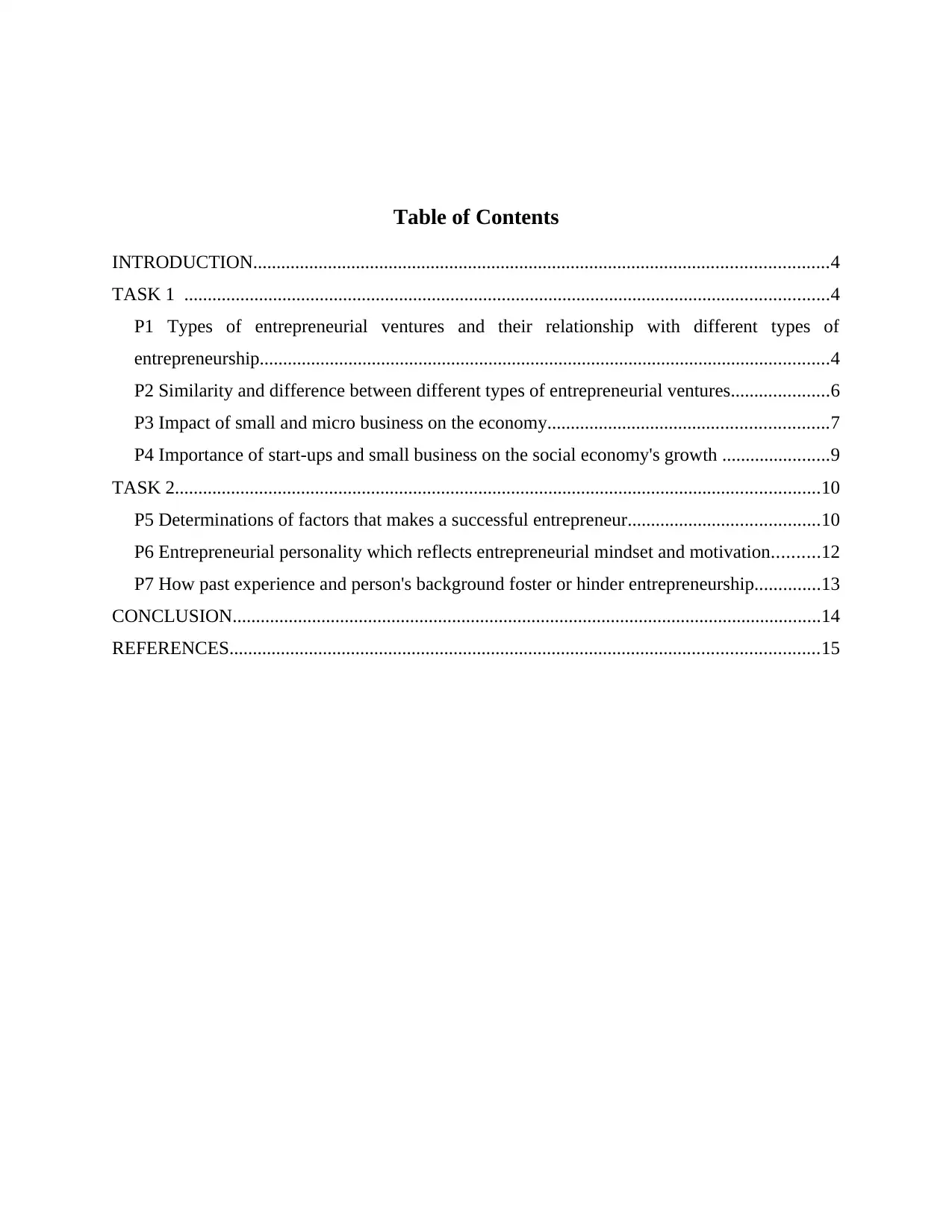
Table of Contents
INTRODUCTION...........................................................................................................................4
TASK 1 ..........................................................................................................................................4
P1 Types of entrepreneurial ventures and their relationship with different types of
entrepreneurship..........................................................................................................................4
P2 Similarity and difference between different types of entrepreneurial ventures.....................6
P3 Impact of small and micro business on the economy............................................................7
P4 Importance of start-ups and small business on the social economy's growth .......................9
TASK 2..........................................................................................................................................10
P5 Determinations of factors that makes a successful entrepreneur.........................................10
P6 Entrepreneurial personality which reflects entrepreneurial mindset and motivation..........12
P7 How past experience and person's background foster or hinder entrepreneurship..............13
CONCLUSION..............................................................................................................................14
REFERENCES..............................................................................................................................15
INTRODUCTION...........................................................................................................................4
TASK 1 ..........................................................................................................................................4
P1 Types of entrepreneurial ventures and their relationship with different types of
entrepreneurship..........................................................................................................................4
P2 Similarity and difference between different types of entrepreneurial ventures.....................6
P3 Impact of small and micro business on the economy............................................................7
P4 Importance of start-ups and small business on the social economy's growth .......................9
TASK 2..........................................................................................................................................10
P5 Determinations of factors that makes a successful entrepreneur.........................................10
P6 Entrepreneurial personality which reflects entrepreneurial mindset and motivation..........12
P7 How past experience and person's background foster or hinder entrepreneurship..............13
CONCLUSION..............................................................................................................................14
REFERENCES..............................................................................................................................15
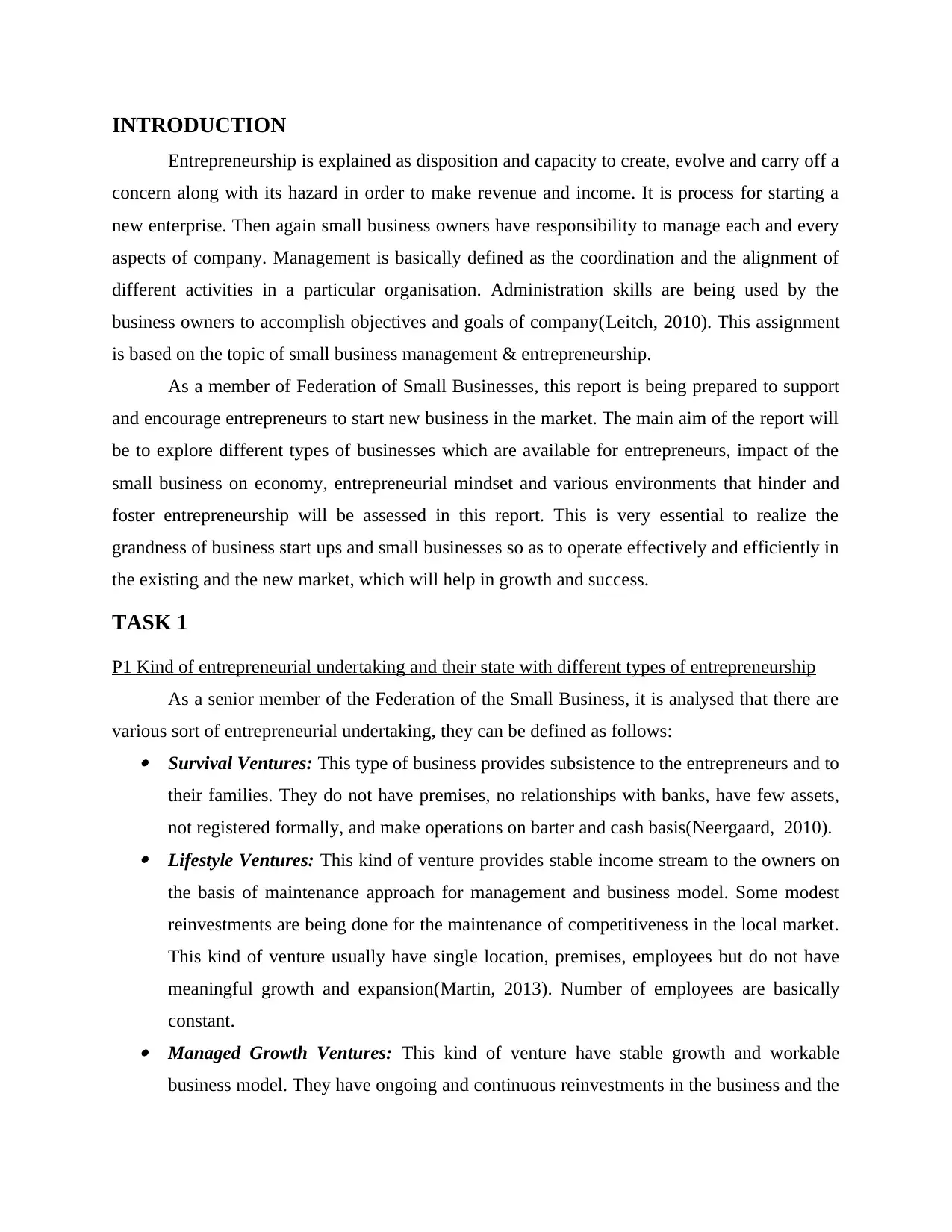
INTRODUCTION
Entrepreneurship is explained as disposition and capacity to create, evolve and carry off a
concern along with its hazard in order to make revenue and income. It is process for starting a
new enterprise. Then again small business owners have responsibility to manage each and every
aspects of company. Management is basically defined as the coordination and the alignment of
different activities in a particular organisation. Administration skills are being used by the
business owners to accomplish objectives and goals of company(Leitch, 2010). This assignment
is based on the topic of small business management & entrepreneurship.
As a member of Federation of Small Businesses, this report is being prepared to support
and encourage entrepreneurs to start new business in the market. The main aim of the report will
be to explore different types of businesses which are available for entrepreneurs, impact of the
small business on economy, entrepreneurial mindset and various environments that hinder and
foster entrepreneurship will be assessed in this report. This is very essential to realize the
grandness of business start ups and small businesses so as to operate effectively and efficiently in
the existing and the new market, which will help in growth and success.
TASK 1
P1 Kind of entrepreneurial undertaking and their state with different types of entrepreneurship
As a senior member of the Federation of the Small Business, it is analysed that there are
various sort of entrepreneurial undertaking, they can be defined as follows: Survival Ventures: This type of business provides subsistence to the entrepreneurs and to
their families. They do not have premises, no relationships with banks, have few assets,
not registered formally, and make operations on barter and cash basis(Neergaard, 2010). Lifestyle Ventures: This kind of venture provides stable income stream to the owners on
the basis of maintenance approach for management and business model. Some modest
reinvestments are being done for the maintenance of competitiveness in the local market.
This kind of venture usually have single location, premises, employees but do not have
meaningful growth and expansion(Martin, 2013). Number of employees are basically
constant. Managed Growth Ventures: This kind of venture have stable growth and workable
business model. They have ongoing and continuous reinvestments in the business and the
Entrepreneurship is explained as disposition and capacity to create, evolve and carry off a
concern along with its hazard in order to make revenue and income. It is process for starting a
new enterprise. Then again small business owners have responsibility to manage each and every
aspects of company. Management is basically defined as the coordination and the alignment of
different activities in a particular organisation. Administration skills are being used by the
business owners to accomplish objectives and goals of company(Leitch, 2010). This assignment
is based on the topic of small business management & entrepreneurship.
As a member of Federation of Small Businesses, this report is being prepared to support
and encourage entrepreneurs to start new business in the market. The main aim of the report will
be to explore different types of businesses which are available for entrepreneurs, impact of the
small business on economy, entrepreneurial mindset and various environments that hinder and
foster entrepreneurship will be assessed in this report. This is very essential to realize the
grandness of business start ups and small businesses so as to operate effectively and efficiently in
the existing and the new market, which will help in growth and success.
TASK 1
P1 Kind of entrepreneurial undertaking and their state with different types of entrepreneurship
As a senior member of the Federation of the Small Business, it is analysed that there are
various sort of entrepreneurial undertaking, they can be defined as follows: Survival Ventures: This type of business provides subsistence to the entrepreneurs and to
their families. They do not have premises, no relationships with banks, have few assets,
not registered formally, and make operations on barter and cash basis(Neergaard, 2010). Lifestyle Ventures: This kind of venture provides stable income stream to the owners on
the basis of maintenance approach for management and business model. Some modest
reinvestments are being done for the maintenance of competitiveness in the local market.
This kind of venture usually have single location, premises, employees but do not have
meaningful growth and expansion(Martin, 2013). Number of employees are basically
constant. Managed Growth Ventures: This kind of venture have stable growth and workable
business model. They have ongoing and continuous reinvestments in the business and the
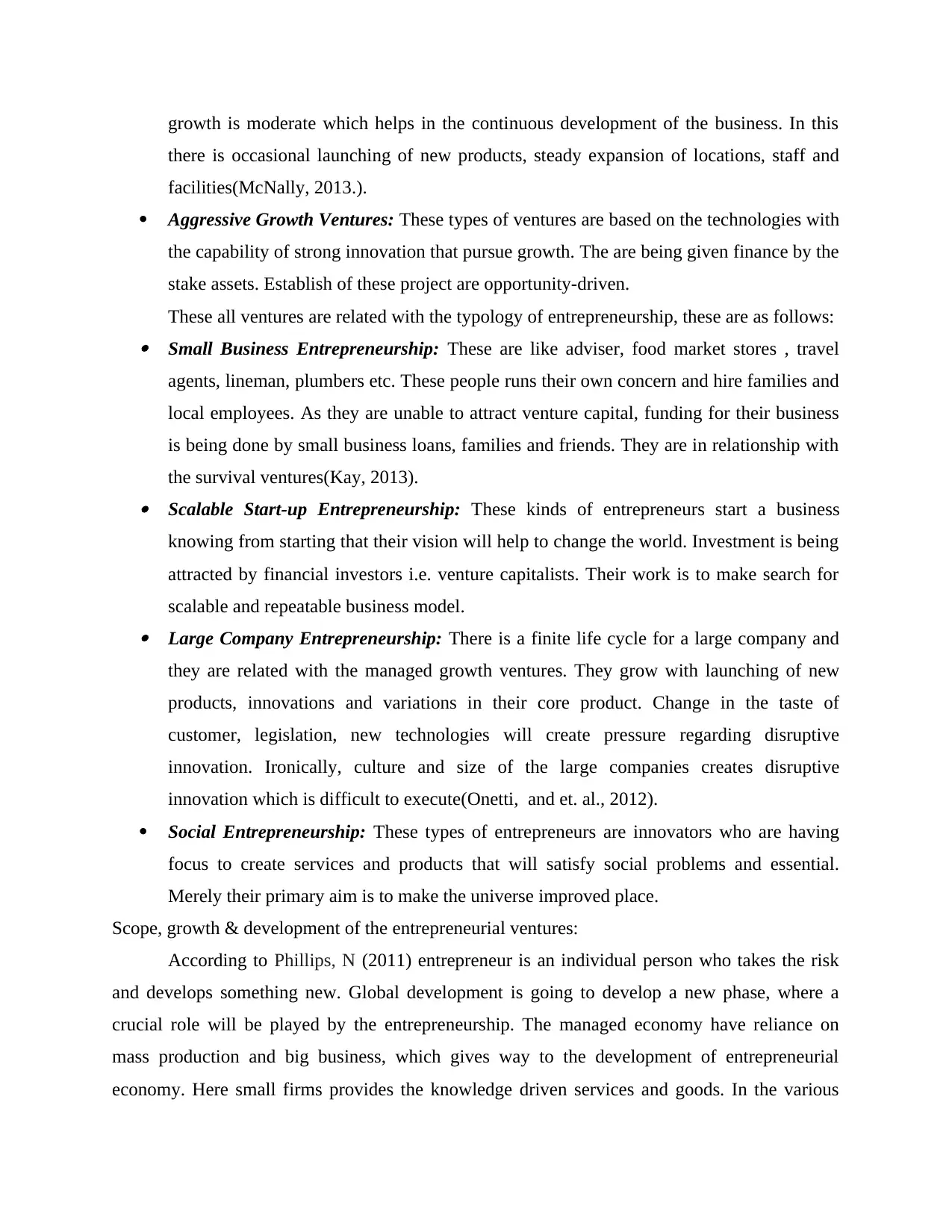
growth is moderate which helps in the continuous development of the business. In this
there is occasional launching of new products, steady expansion of locations, staff and
facilities(McNally, 2013.).
Aggressive Growth Ventures: These types of ventures are based on the technologies with
the capability of strong innovation that pursue growth. The are being given finance by the
stake assets. Establish of these project are opportunity-driven.
These all ventures are related with the typology of entrepreneurship, these are as follows: Small Business Entrepreneurship: These are like adviser, food market stores , travel
agents, lineman, plumbers etc. These people runs their own concern and hire families and
local employees. As they are unable to attract venture capital, funding for their business
is being done by small business loans, families and friends. They are in relationship with
the survival ventures(Kay, 2013). Scalable Start-up Entrepreneurship: These kinds of entrepreneurs start a business
knowing from starting that their vision will help to change the world. Investment is being
attracted by financial investors i.e. venture capitalists. Their work is to make search for
scalable and repeatable business model. Large Company Entrepreneurship: There is a finite life cycle for a large company and
they are related with the managed growth ventures. They grow with launching of new
products, innovations and variations in their core product. Change in the taste of
customer, legislation, new technologies will create pressure regarding disruptive
innovation. Ironically, culture and size of the large companies creates disruptive
innovation which is difficult to execute(Onetti, and et. al., 2012).
Social Entrepreneurship: These types of entrepreneurs are innovators who are having
focus to create services and products that will satisfy social problems and essential.
Merely their primary aim is to make the universe improved place.
Scope, growth & development of the entrepreneurial ventures:
According to Phillips, N (2011) entrepreneur is an individual person who takes the risk
and develops something new. Global development is going to develop a new phase, where a
crucial role will be played by the entrepreneurship. The managed economy have reliance on
mass production and big business, which gives way to the development of entrepreneurial
economy. Here small firms provides the knowledge driven services and goods. In the various
there is occasional launching of new products, steady expansion of locations, staff and
facilities(McNally, 2013.).
Aggressive Growth Ventures: These types of ventures are based on the technologies with
the capability of strong innovation that pursue growth. The are being given finance by the
stake assets. Establish of these project are opportunity-driven.
These all ventures are related with the typology of entrepreneurship, these are as follows: Small Business Entrepreneurship: These are like adviser, food market stores , travel
agents, lineman, plumbers etc. These people runs their own concern and hire families and
local employees. As they are unable to attract venture capital, funding for their business
is being done by small business loans, families and friends. They are in relationship with
the survival ventures(Kay, 2013). Scalable Start-up Entrepreneurship: These kinds of entrepreneurs start a business
knowing from starting that their vision will help to change the world. Investment is being
attracted by financial investors i.e. venture capitalists. Their work is to make search for
scalable and repeatable business model. Large Company Entrepreneurship: There is a finite life cycle for a large company and
they are related with the managed growth ventures. They grow with launching of new
products, innovations and variations in their core product. Change in the taste of
customer, legislation, new technologies will create pressure regarding disruptive
innovation. Ironically, culture and size of the large companies creates disruptive
innovation which is difficult to execute(Onetti, and et. al., 2012).
Social Entrepreneurship: These types of entrepreneurs are innovators who are having
focus to create services and products that will satisfy social problems and essential.
Merely their primary aim is to make the universe improved place.
Scope, growth & development of the entrepreneurial ventures:
According to Phillips, N (2011) entrepreneur is an individual person who takes the risk
and develops something new. Global development is going to develop a new phase, where a
crucial role will be played by the entrepreneurship. The managed economy have reliance on
mass production and big business, which gives way to the development of entrepreneurial
economy. Here small firms provides the knowledge driven services and goods. In the various
Secure Best Marks with AI Grader
Need help grading? Try our AI Grader for instant feedback on your assignments.
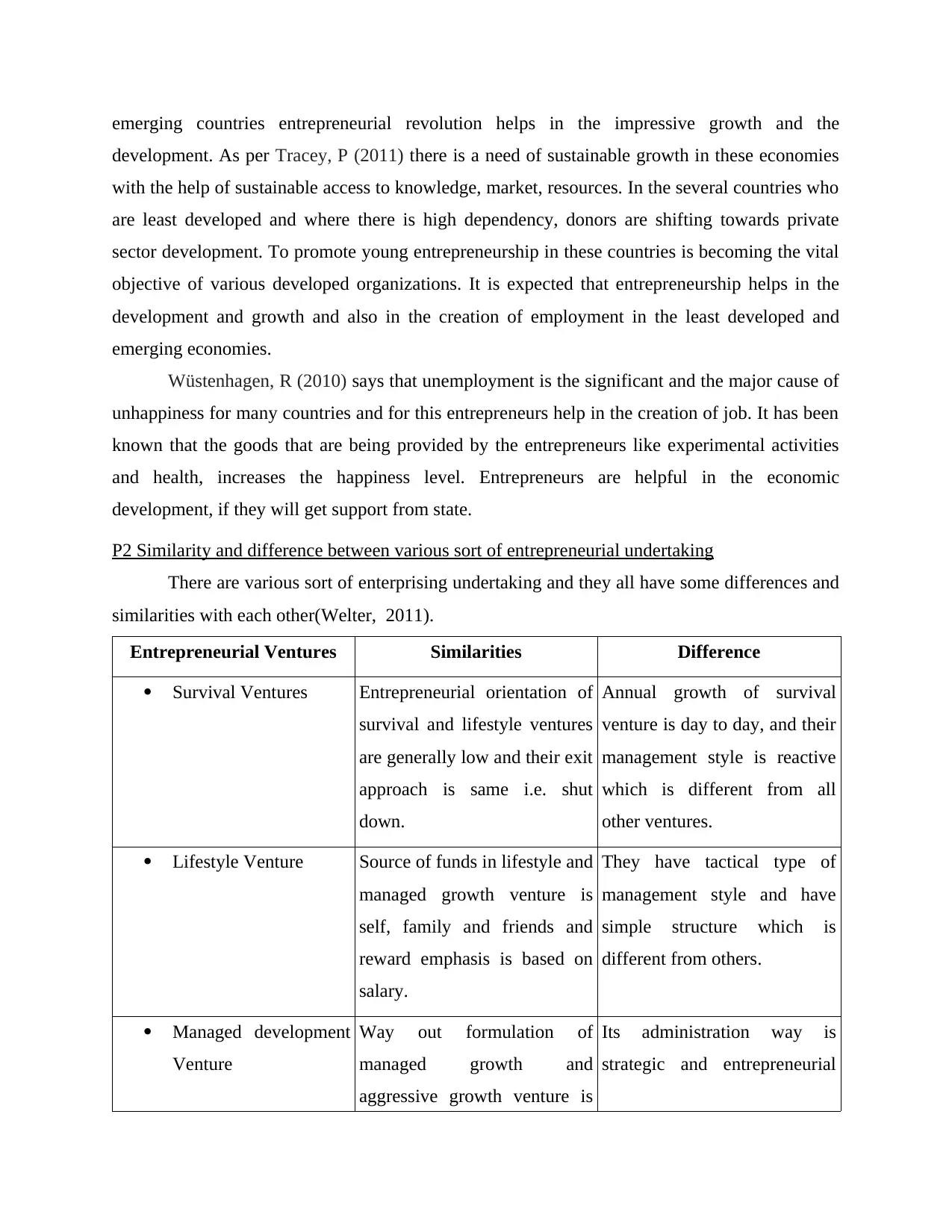
emerging countries entrepreneurial revolution helps in the impressive growth and the
development. As per Tracey, P (2011) there is a need of sustainable growth in these economies
with the help of sustainable access to knowledge, market, resources. In the several countries who
are least developed and where there is high dependency, donors are shifting towards private
sector development. To promote young entrepreneurship in these countries is becoming the vital
objective of various developed organizations. It is expected that entrepreneurship helps in the
development and growth and also in the creation of employment in the least developed and
emerging economies.
Wüstenhagen, R (2010) says that unemployment is the significant and the major cause of
unhappiness for many countries and for this entrepreneurs help in the creation of job. It has been
known that the goods that are being provided by the entrepreneurs like experimental activities
and health, increases the happiness level. Entrepreneurs are helpful in the economic
development, if they will get support from state.
P2 Similarity and difference between various sort of entrepreneurial undertaking
There are various sort of enterprising undertaking and they all have some differences and
similarities with each other(Welter, 2011).
Entrepreneurial Ventures Similarities Difference
Survival Ventures Entrepreneurial orientation of
survival and lifestyle ventures
are generally low and their exit
approach is same i.e. shut
down.
Annual growth of survival
venture is day to day, and their
management style is reactive
which is different from all
other ventures.
Lifestyle Venture Source of funds in lifestyle and
managed growth venture is
self, family and friends and
reward emphasis is based on
salary.
They have tactical type of
management style and have
simple structure which is
different from others.
Managed development
Venture
Way out formulation of
managed growth and
aggressive growth venture is
Its administration way is
strategic and entrepreneurial
development. As per Tracey, P (2011) there is a need of sustainable growth in these economies
with the help of sustainable access to knowledge, market, resources. In the several countries who
are least developed and where there is high dependency, donors are shifting towards private
sector development. To promote young entrepreneurship in these countries is becoming the vital
objective of various developed organizations. It is expected that entrepreneurship helps in the
development and growth and also in the creation of employment in the least developed and
emerging economies.
Wüstenhagen, R (2010) says that unemployment is the significant and the major cause of
unhappiness for many countries and for this entrepreneurs help in the creation of job. It has been
known that the goods that are being provided by the entrepreneurs like experimental activities
and health, increases the happiness level. Entrepreneurs are helpful in the economic
development, if they will get support from state.
P2 Similarity and difference between various sort of entrepreneurial undertaking
There are various sort of enterprising undertaking and they all have some differences and
similarities with each other(Welter, 2011).
Entrepreneurial Ventures Similarities Difference
Survival Ventures Entrepreneurial orientation of
survival and lifestyle ventures
are generally low and their exit
approach is same i.e. shut
down.
Annual growth of survival
venture is day to day, and their
management style is reactive
which is different from all
other ventures.
Lifestyle Venture Source of funds in lifestyle and
managed growth venture is
self, family and friends and
reward emphasis is based on
salary.
They have tactical type of
management style and have
simple structure which is
different from others.
Managed development
Venture
Way out formulation of
managed growth and
aggressive growth venture is
Its administration way is
strategic and entrepreneurial
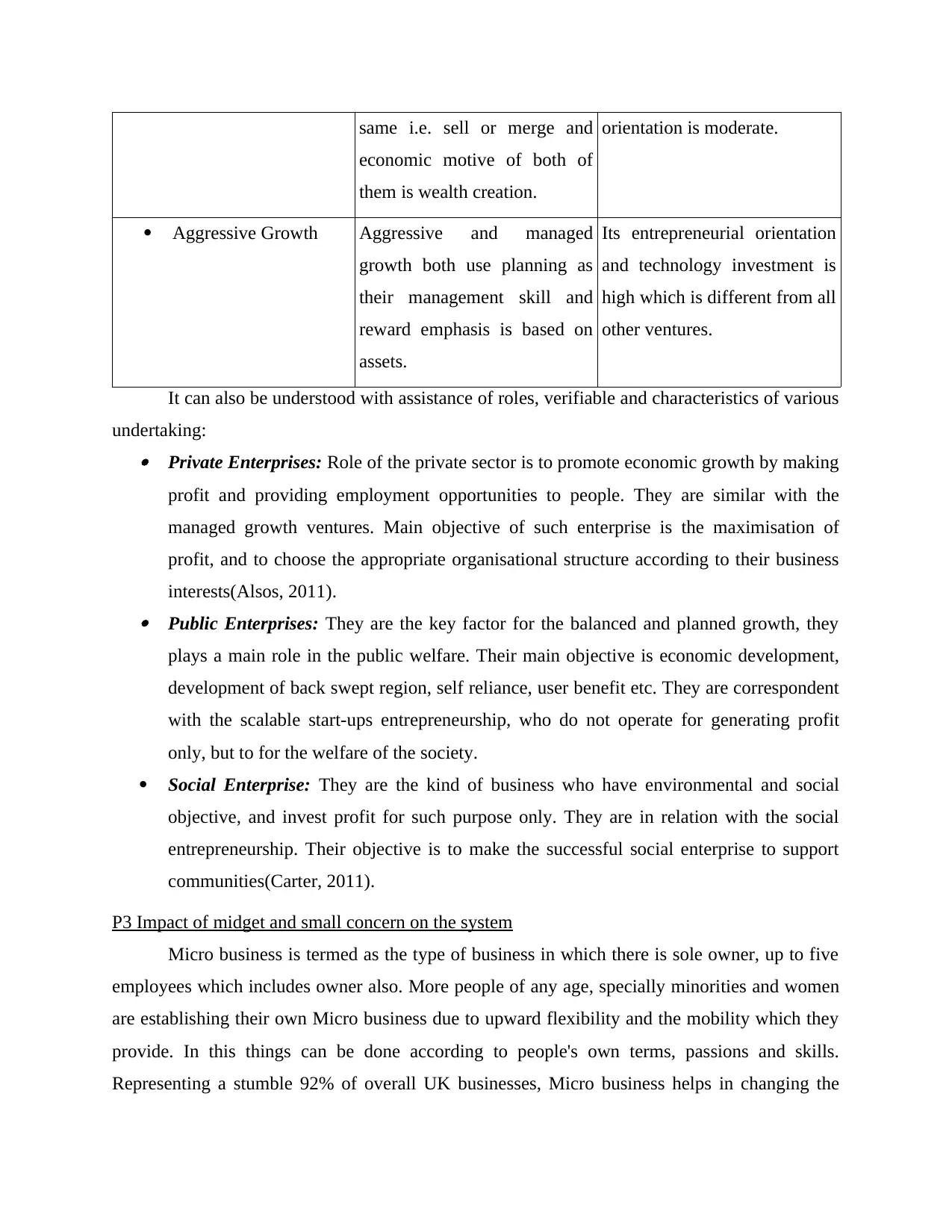
same i.e. sell or merge and
economic motive of both of
them is wealth creation.
orientation is moderate.
Aggressive Growth Aggressive and managed
growth both use planning as
their management skill and
reward emphasis is based on
assets.
Its entrepreneurial orientation
and technology investment is
high which is different from all
other ventures.
It can also be understood with assistance of roles, verifiable and characteristics of various
undertaking: Private Enterprises: Role of the private sector is to promote economic growth by making
profit and providing employment opportunities to people. They are similar with the
managed growth ventures. Main objective of such enterprise is the maximisation of
profit, and to choose the appropriate organisational structure according to their business
interests(Alsos, 2011). Public Enterprises: They are the key factor for the balanced and planned growth, they
plays a main role in the public welfare. Their main objective is economic development,
development of back swept region, self reliance, user benefit etc. They are correspondent
with the scalable start-ups entrepreneurship, who do not operate for generating profit
only, but to for the welfare of the society.
Social Enterprise: They are the kind of business who have environmental and social
objective, and invest profit for such purpose only. They are in relation with the social
entrepreneurship. Their objective is to make the successful social enterprise to support
communities(Carter, 2011).
P3 Impact of midget and small concern on the system
Micro business is termed as the type of business in which there is sole owner, up to five
employees which includes owner also. More people of any age, specially minorities and women
are establishing their own Micro business due to upward flexibility and the mobility which they
provide. In this things can be done according to people's own terms, passions and skills.
Representing a stumble 92% of overall UK businesses, Micro business helps in changing the
economic motive of both of
them is wealth creation.
orientation is moderate.
Aggressive Growth Aggressive and managed
growth both use planning as
their management skill and
reward emphasis is based on
assets.
Its entrepreneurial orientation
and technology investment is
high which is different from all
other ventures.
It can also be understood with assistance of roles, verifiable and characteristics of various
undertaking: Private Enterprises: Role of the private sector is to promote economic growth by making
profit and providing employment opportunities to people. They are similar with the
managed growth ventures. Main objective of such enterprise is the maximisation of
profit, and to choose the appropriate organisational structure according to their business
interests(Alsos, 2011). Public Enterprises: They are the key factor for the balanced and planned growth, they
plays a main role in the public welfare. Their main objective is economic development,
development of back swept region, self reliance, user benefit etc. They are correspondent
with the scalable start-ups entrepreneurship, who do not operate for generating profit
only, but to for the welfare of the society.
Social Enterprise: They are the kind of business who have environmental and social
objective, and invest profit for such purpose only. They are in relation with the social
entrepreneurship. Their objective is to make the successful social enterprise to support
communities(Carter, 2011).
P3 Impact of midget and small concern on the system
Micro business is termed as the type of business in which there is sole owner, up to five
employees which includes owner also. More people of any age, specially minorities and women
are establishing their own Micro business due to upward flexibility and the mobility which they
provide. In this things can be done according to people's own terms, passions and skills.
Representing a stumble 92% of overall UK businesses, Micro business helps in changing the
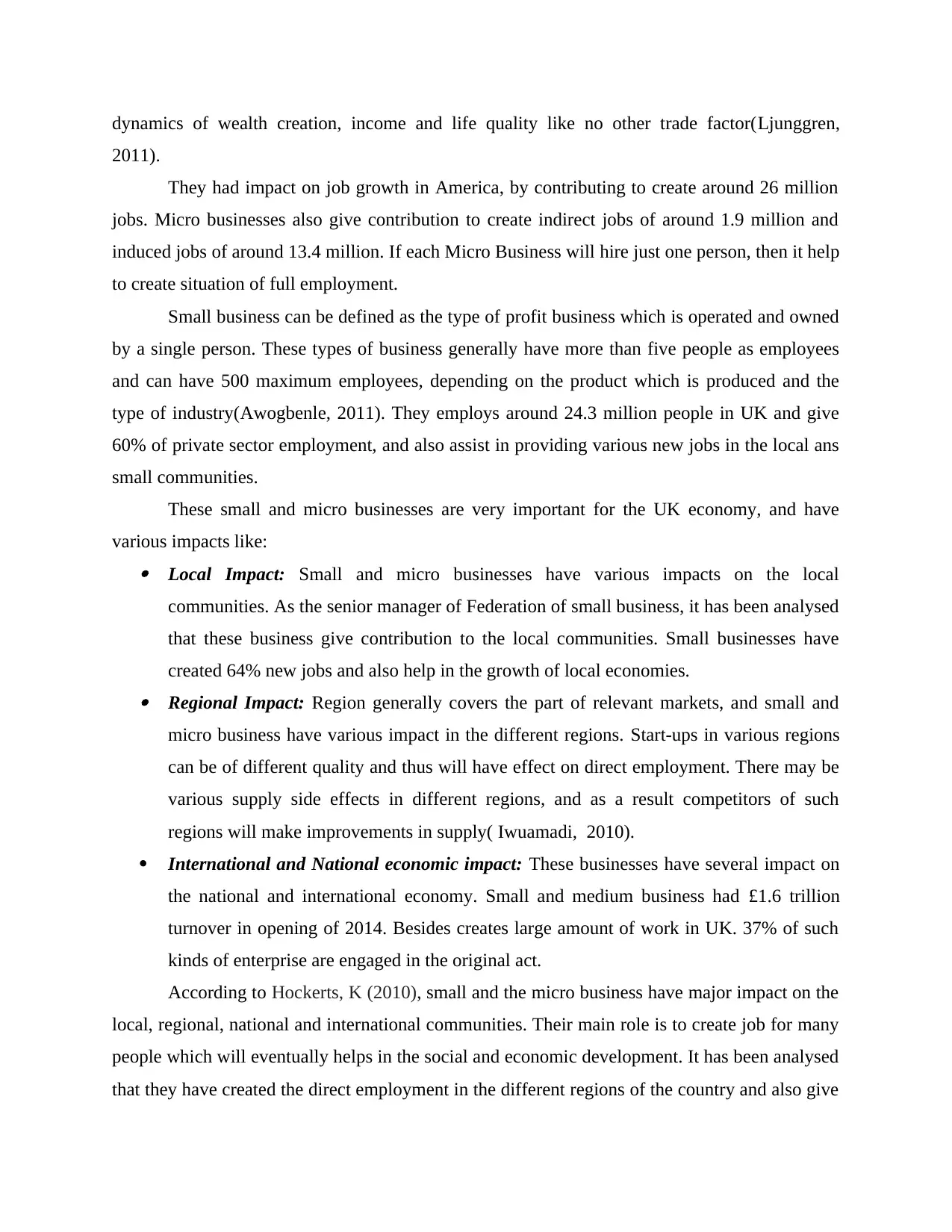
dynamics of wealth creation, income and life quality like no other trade factor(Ljunggren,
2011).
They had impact on job growth in America, by contributing to create around 26 million
jobs. Micro businesses also give contribution to create indirect jobs of around 1.9 million and
induced jobs of around 13.4 million. If each Micro Business will hire just one person, then it help
to create situation of full employment.
Small business can be defined as the type of profit business which is operated and owned
by a single person. These types of business generally have more than five people as employees
and can have 500 maximum employees, depending on the product which is produced and the
type of industry(Awogbenle, 2011). They employs around 24.3 million people in UK and give
60% of private sector employment, and also assist in providing various new jobs in the local ans
small communities.
These small and micro businesses are very important for the UK economy, and have
various impacts like: Local Impact: Small and micro businesses have various impacts on the local
communities. As the senior manager of Federation of small business, it has been analysed
that these business give contribution to the local communities. Small businesses have
created 64% new jobs and also help in the growth of local economies. Regional Impact: Region generally covers the part of relevant markets, and small and
micro business have various impact in the different regions. Start-ups in various regions
can be of different quality and thus will have effect on direct employment. There may be
various supply side effects in different regions, and as a result competitors of such
regions will make improvements in supply( Iwuamadi, 2010).
International and National economic impact: These businesses have several impact on
the national and international economy. Small and medium business had £1.6 trillion
turnover in opening of 2014. Besides creates large amount of work in UK. 37% of such
kinds of enterprise are engaged in the original act.
According to Hockerts, K (2010), small and the micro business have major impact on the
local, regional, national and international communities. Their main role is to create job for many
people which will eventually helps in the social and economic development. It has been analysed
that they have created the direct employment in the different regions of the country and also give
2011).
They had impact on job growth in America, by contributing to create around 26 million
jobs. Micro businesses also give contribution to create indirect jobs of around 1.9 million and
induced jobs of around 13.4 million. If each Micro Business will hire just one person, then it help
to create situation of full employment.
Small business can be defined as the type of profit business which is operated and owned
by a single person. These types of business generally have more than five people as employees
and can have 500 maximum employees, depending on the product which is produced and the
type of industry(Awogbenle, 2011). They employs around 24.3 million people in UK and give
60% of private sector employment, and also assist in providing various new jobs in the local ans
small communities.
These small and micro businesses are very important for the UK economy, and have
various impacts like: Local Impact: Small and micro businesses have various impacts on the local
communities. As the senior manager of Federation of small business, it has been analysed
that these business give contribution to the local communities. Small businesses have
created 64% new jobs and also help in the growth of local economies. Regional Impact: Region generally covers the part of relevant markets, and small and
micro business have various impact in the different regions. Start-ups in various regions
can be of different quality and thus will have effect on direct employment. There may be
various supply side effects in different regions, and as a result competitors of such
regions will make improvements in supply( Iwuamadi, 2010).
International and National economic impact: These businesses have several impact on
the national and international economy. Small and medium business had £1.6 trillion
turnover in opening of 2014. Besides creates large amount of work in UK. 37% of such
kinds of enterprise are engaged in the original act.
According to Hockerts, K (2010), small and the micro business have major impact on the
local, regional, national and international communities. Their main role is to create job for many
people which will eventually helps in the social and economic development. It has been analysed
that they have created the direct employment in the different regions of the country and also give
Paraphrase This Document
Need a fresh take? Get an instant paraphrase of this document with our AI Paraphraser
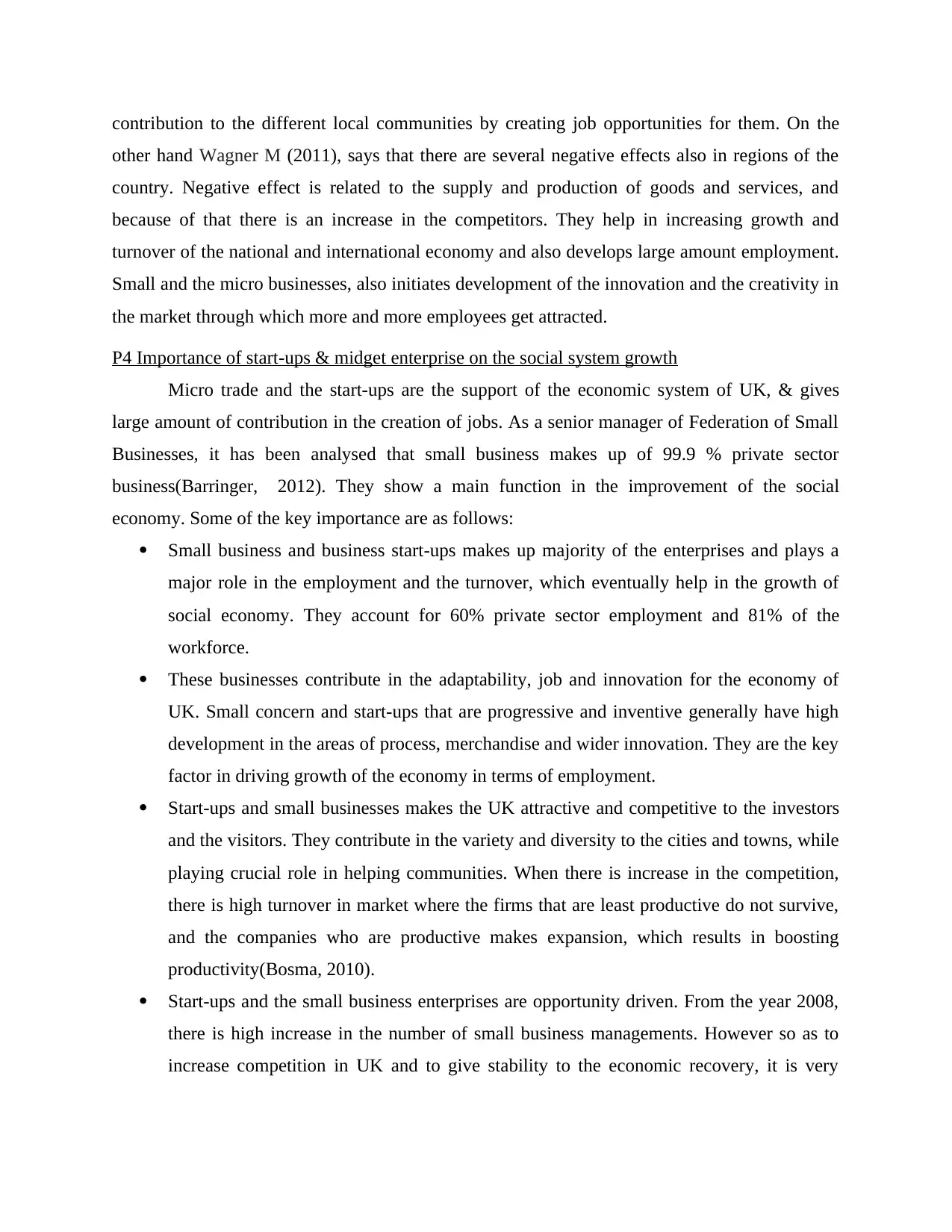
contribution to the different local communities by creating job opportunities for them. On the
other hand Wagner M (2011), says that there are several negative effects also in regions of the
country. Negative effect is related to the supply and production of goods and services, and
because of that there is an increase in the competitors. They help in increasing growth and
turnover of the national and international economy and also develops large amount employment.
Small and the micro businesses, also initiates development of the innovation and the creativity in
the market through which more and more employees get attracted.
P4 Importance of start-ups & midget enterprise on the social system growth
Micro trade and the start-ups are the support of the economic system of UK, & gives
large amount of contribution in the creation of jobs. As a senior manager of Federation of Small
Businesses, it has been analysed that small business makes up of 99.9 % private sector
business(Barringer, 2012). They show a main function in the improvement of the social
economy. Some of the key importance are as follows:
Small business and business start-ups makes up majority of the enterprises and plays a
major role in the employment and the turnover, which eventually help in the growth of
social economy. They account for 60% private sector employment and 81% of the
workforce.
These businesses contribute in the adaptability, job and innovation for the economy of
UK. Small concern and start-ups that are progressive and inventive generally have high
development in the areas of process, merchandise and wider innovation. They are the key
factor in driving growth of the economy in terms of employment.
Start-ups and small businesses makes the UK attractive and competitive to the investors
and the visitors. They contribute in the variety and diversity to the cities and towns, while
playing crucial role in helping communities. When there is increase in the competition,
there is high turnover in market where the firms that are least productive do not survive,
and the companies who are productive makes expansion, which results in boosting
productivity(Bosma, 2010).
Start-ups and the small business enterprises are opportunity driven. From the year 2008,
there is high increase in the number of small business managements. However so as to
increase competition in UK and to give stability to the economic recovery, it is very
other hand Wagner M (2011), says that there are several negative effects also in regions of the
country. Negative effect is related to the supply and production of goods and services, and
because of that there is an increase in the competitors. They help in increasing growth and
turnover of the national and international economy and also develops large amount employment.
Small and the micro businesses, also initiates development of the innovation and the creativity in
the market through which more and more employees get attracted.
P4 Importance of start-ups & midget enterprise on the social system growth
Micro trade and the start-ups are the support of the economic system of UK, & gives
large amount of contribution in the creation of jobs. As a senior manager of Federation of Small
Businesses, it has been analysed that small business makes up of 99.9 % private sector
business(Barringer, 2012). They show a main function in the improvement of the social
economy. Some of the key importance are as follows:
Small business and business start-ups makes up majority of the enterprises and plays a
major role in the employment and the turnover, which eventually help in the growth of
social economy. They account for 60% private sector employment and 81% of the
workforce.
These businesses contribute in the adaptability, job and innovation for the economy of
UK. Small concern and start-ups that are progressive and inventive generally have high
development in the areas of process, merchandise and wider innovation. They are the key
factor in driving growth of the economy in terms of employment.
Start-ups and small businesses makes the UK attractive and competitive to the investors
and the visitors. They contribute in the variety and diversity to the cities and towns, while
playing crucial role in helping communities. When there is increase in the competition,
there is high turnover in market where the firms that are least productive do not survive,
and the companies who are productive makes expansion, which results in boosting
productivity(Bosma, 2010).
Start-ups and the small business enterprises are opportunity driven. From the year 2008,
there is high increase in the number of small business managements. However so as to
increase competition in UK and to give stability to the economic recovery, it is very
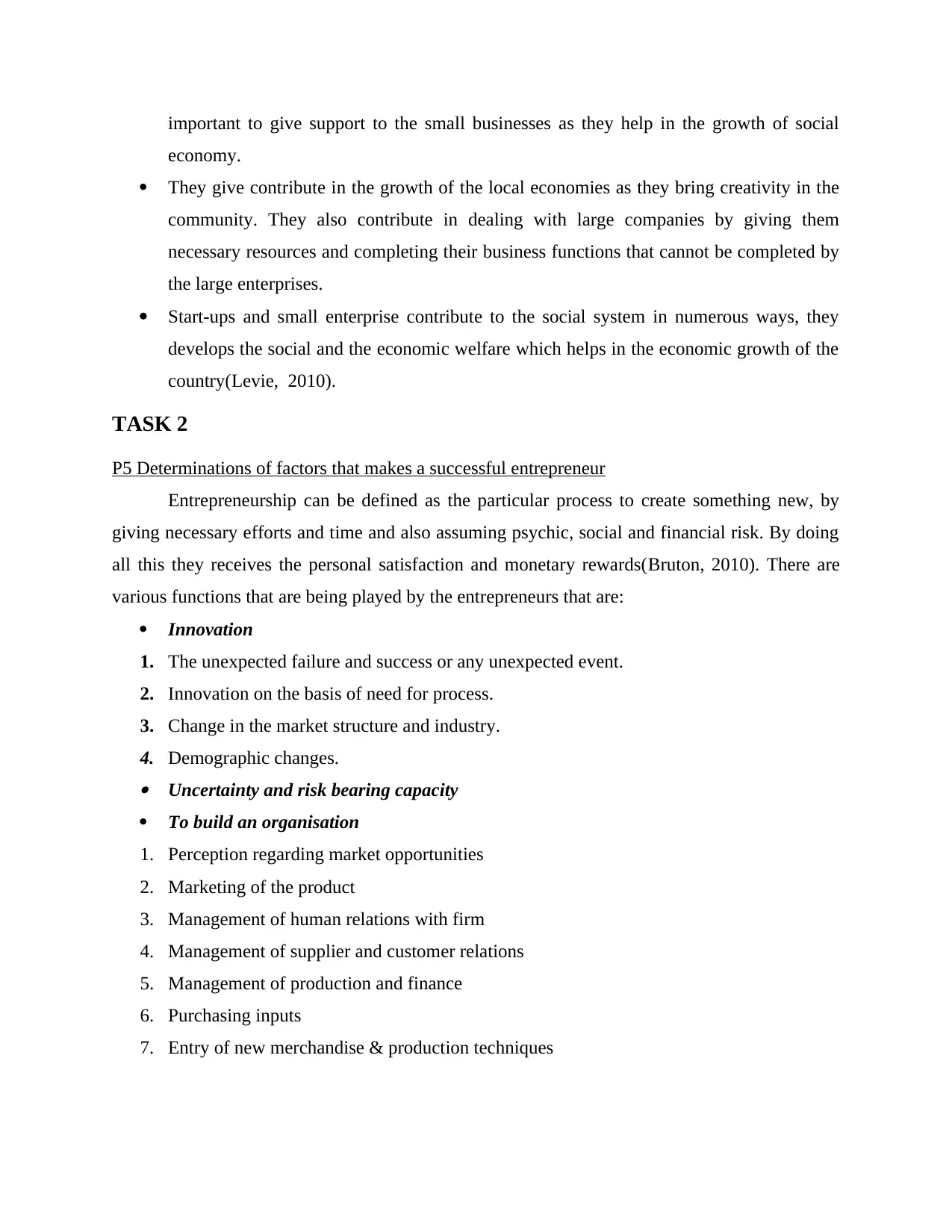
important to give support to the small businesses as they help in the growth of social
economy.
They give contribute in the growth of the local economies as they bring creativity in the
community. They also contribute in dealing with large companies by giving them
necessary resources and completing their business functions that cannot be completed by
the large enterprises.
Start-ups and small enterprise contribute to the social system in numerous ways, they
develops the social and the economic welfare which helps in the economic growth of the
country(Levie, 2010).
TASK 2
P5 Determinations of factors that makes a successful entrepreneur
Entrepreneurship can be defined as the particular process to create something new, by
giving necessary efforts and time and also assuming psychic, social and financial risk. By doing
all this they receives the personal satisfaction and monetary rewards(Bruton, 2010). There are
various functions that are being played by the entrepreneurs that are:
Innovation
1. The unexpected failure and success or any unexpected event.
2. Innovation on the basis of need for process.
3. Change in the market structure and industry.
4. Demographic changes. Uncertainty and risk bearing capacity
To build an organisation
1. Perception regarding market opportunities
2. Marketing of the product
3. Management of human relations with firm
4. Management of supplier and customer relations
5. Management of production and finance
6. Purchasing inputs
7. Entry of new merchandise & production techniques
economy.
They give contribute in the growth of the local economies as they bring creativity in the
community. They also contribute in dealing with large companies by giving them
necessary resources and completing their business functions that cannot be completed by
the large enterprises.
Start-ups and small enterprise contribute to the social system in numerous ways, they
develops the social and the economic welfare which helps in the economic growth of the
country(Levie, 2010).
TASK 2
P5 Determinations of factors that makes a successful entrepreneur
Entrepreneurship can be defined as the particular process to create something new, by
giving necessary efforts and time and also assuming psychic, social and financial risk. By doing
all this they receives the personal satisfaction and monetary rewards(Bruton, 2010). There are
various functions that are being played by the entrepreneurs that are:
Innovation
1. The unexpected failure and success or any unexpected event.
2. Innovation on the basis of need for process.
3. Change in the market structure and industry.
4. Demographic changes. Uncertainty and risk bearing capacity
To build an organisation
1. Perception regarding market opportunities
2. Marketing of the product
3. Management of human relations with firm
4. Management of supplier and customer relations
5. Management of production and finance
6. Purchasing inputs
7. Entry of new merchandise & production techniques
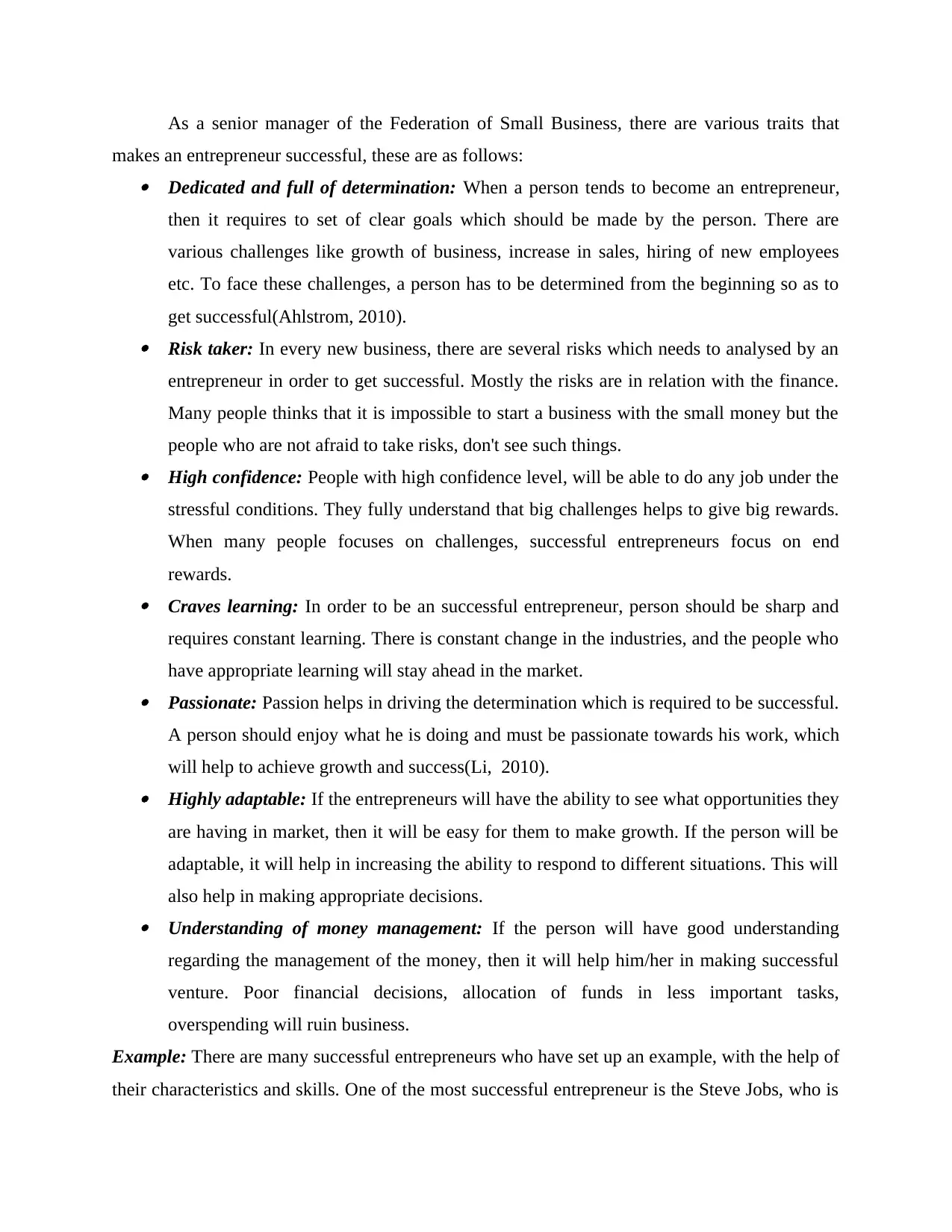
As a senior manager of the Federation of Small Business, there are various traits that
makes an entrepreneur successful, these are as follows: Dedicated and full of determination: When a person tends to become an entrepreneur,
then it requires to set of clear goals which should be made by the person. There are
various challenges like growth of business, increase in sales, hiring of new employees
etc. To face these challenges, a person has to be determined from the beginning so as to
get successful(Ahlstrom, 2010). Risk taker: In every new business, there are several risks which needs to analysed by an
entrepreneur in order to get successful. Mostly the risks are in relation with the finance.
Many people thinks that it is impossible to start a business with the small money but the
people who are not afraid to take risks, don't see such things. High confidence: People with high confidence level, will be able to do any job under the
stressful conditions. They fully understand that big challenges helps to give big rewards.
When many people focuses on challenges, successful entrepreneurs focus on end
rewards. Craves learning: In order to be an successful entrepreneur, person should be sharp and
requires constant learning. There is constant change in the industries, and the people who
have appropriate learning will stay ahead in the market. Passionate: Passion helps in driving the determination which is required to be successful.
A person should enjoy what he is doing and must be passionate towards his work, which
will help to achieve growth and success(Li, 2010). Highly adaptable: If the entrepreneurs will have the ability to see what opportunities they
are having in market, then it will be easy for them to make growth. If the person will be
adaptable, it will help in increasing the ability to respond to different situations. This will
also help in making appropriate decisions. Understanding of money management: If the person will have good understanding
regarding the management of the money, then it will help him/her in making successful
venture. Poor financial decisions, allocation of funds in less important tasks,
overspending will ruin business.
Example: There are many successful entrepreneurs who have set up an example, with the help of
their characteristics and skills. One of the most successful entrepreneur is the Steve Jobs, who is
makes an entrepreneur successful, these are as follows: Dedicated and full of determination: When a person tends to become an entrepreneur,
then it requires to set of clear goals which should be made by the person. There are
various challenges like growth of business, increase in sales, hiring of new employees
etc. To face these challenges, a person has to be determined from the beginning so as to
get successful(Ahlstrom, 2010). Risk taker: In every new business, there are several risks which needs to analysed by an
entrepreneur in order to get successful. Mostly the risks are in relation with the finance.
Many people thinks that it is impossible to start a business with the small money but the
people who are not afraid to take risks, don't see such things. High confidence: People with high confidence level, will be able to do any job under the
stressful conditions. They fully understand that big challenges helps to give big rewards.
When many people focuses on challenges, successful entrepreneurs focus on end
rewards. Craves learning: In order to be an successful entrepreneur, person should be sharp and
requires constant learning. There is constant change in the industries, and the people who
have appropriate learning will stay ahead in the market. Passionate: Passion helps in driving the determination which is required to be successful.
A person should enjoy what he is doing and must be passionate towards his work, which
will help to achieve growth and success(Li, 2010). Highly adaptable: If the entrepreneurs will have the ability to see what opportunities they
are having in market, then it will be easy for them to make growth. If the person will be
adaptable, it will help in increasing the ability to respond to different situations. This will
also help in making appropriate decisions. Understanding of money management: If the person will have good understanding
regarding the management of the money, then it will help him/her in making successful
venture. Poor financial decisions, allocation of funds in less important tasks,
overspending will ruin business.
Example: There are many successful entrepreneurs who have set up an example, with the help of
their characteristics and skills. One of the most successful entrepreneur is the Steve Jobs, who is
Secure Best Marks with AI Grader
Need help grading? Try our AI Grader for instant feedback on your assignments.
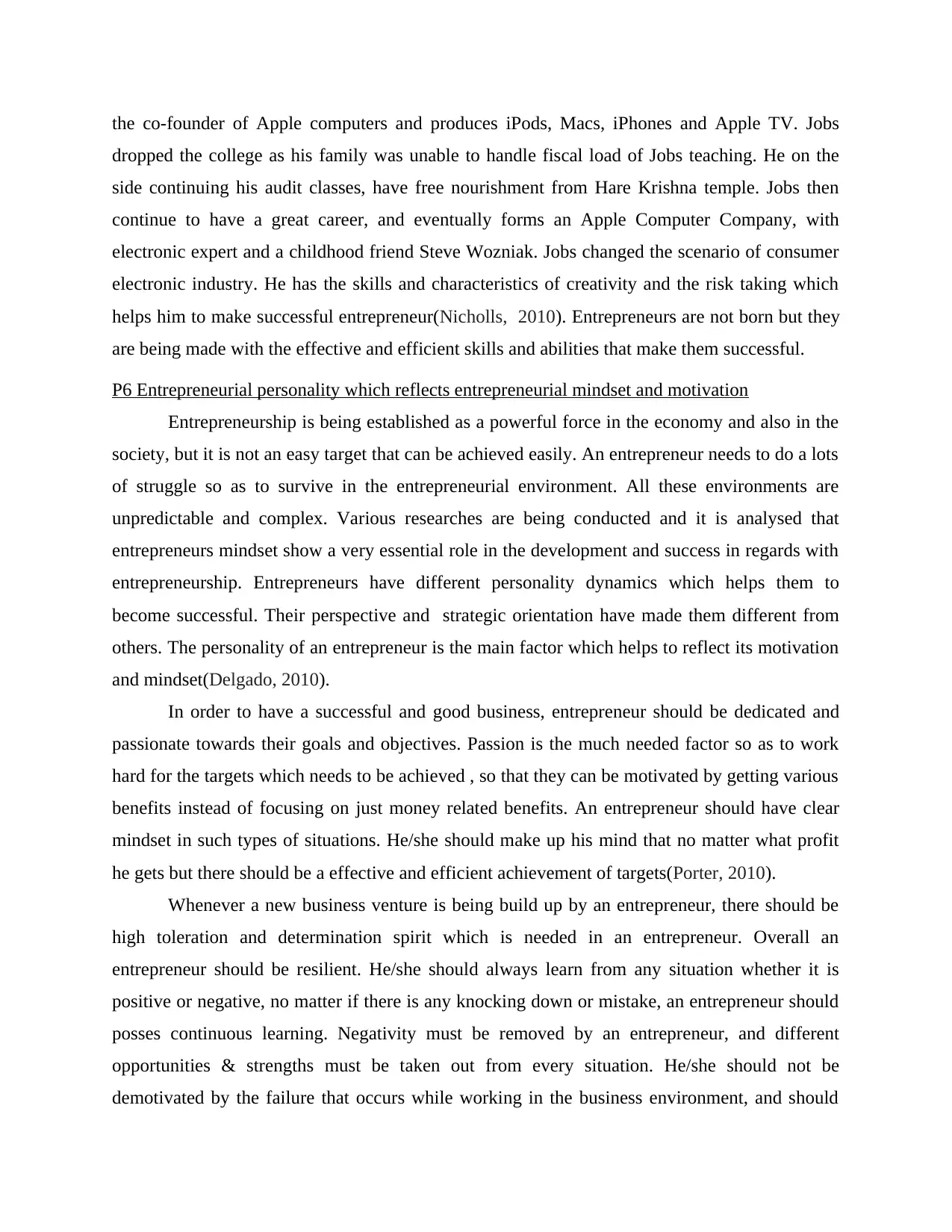
the co-founder of Apple computers and produces iPods, Macs, iPhones and Apple TV. Jobs
dropped the college as his family was unable to handle fiscal load of Jobs teaching. He on the
side continuing his audit classes, have free nourishment from Hare Krishna temple. Jobs then
continue to have a great career, and eventually forms an Apple Computer Company, with
electronic expert and a childhood friend Steve Wozniak. Jobs changed the scenario of consumer
electronic industry. He has the skills and characteristics of creativity and the risk taking which
helps him to make successful entrepreneur(Nicholls, 2010). Entrepreneurs are not born but they
are being made with the effective and efficient skills and abilities that make them successful.
P6 Entrepreneurial personality which reflects entrepreneurial mindset and motivation
Entrepreneurship is being established as a powerful force in the economy and also in the
society, but it is not an easy target that can be achieved easily. An entrepreneur needs to do a lots
of struggle so as to survive in the entrepreneurial environment. All these environments are
unpredictable and complex. Various researches are being conducted and it is analysed that
entrepreneurs mindset show a very essential role in the development and success in regards with
entrepreneurship. Entrepreneurs have different personality dynamics which helps them to
become successful. Their perspective and strategic orientation have made them different from
others. The personality of an entrepreneur is the main factor which helps to reflect its motivation
and mindset(Delgado, 2010).
In order to have a successful and good business, entrepreneur should be dedicated and
passionate towards their goals and objectives. Passion is the much needed factor so as to work
hard for the targets which needs to be achieved , so that they can be motivated by getting various
benefits instead of focusing on just money related benefits. An entrepreneur should have clear
mindset in such types of situations. He/she should make up his mind that no matter what profit
he gets but there should be a effective and efficient achievement of targets(Porter, 2010).
Whenever a new business venture is being build up by an entrepreneur, there should be
high toleration and determination spirit which is needed in an entrepreneur. Overall an
entrepreneur should be resilient. He/she should always learn from any situation whether it is
positive or negative, no matter if there is any knocking down or mistake, an entrepreneur should
posses continuous learning. Negativity must be removed by an entrepreneur, and different
opportunities & strengths must be taken out from every situation. He/she should not be
demotivated by the failure that occurs while working in the business environment, and should
dropped the college as his family was unable to handle fiscal load of Jobs teaching. He on the
side continuing his audit classes, have free nourishment from Hare Krishna temple. Jobs then
continue to have a great career, and eventually forms an Apple Computer Company, with
electronic expert and a childhood friend Steve Wozniak. Jobs changed the scenario of consumer
electronic industry. He has the skills and characteristics of creativity and the risk taking which
helps him to make successful entrepreneur(Nicholls, 2010). Entrepreneurs are not born but they
are being made with the effective and efficient skills and abilities that make them successful.
P6 Entrepreneurial personality which reflects entrepreneurial mindset and motivation
Entrepreneurship is being established as a powerful force in the economy and also in the
society, but it is not an easy target that can be achieved easily. An entrepreneur needs to do a lots
of struggle so as to survive in the entrepreneurial environment. All these environments are
unpredictable and complex. Various researches are being conducted and it is analysed that
entrepreneurs mindset show a very essential role in the development and success in regards with
entrepreneurship. Entrepreneurs have different personality dynamics which helps them to
become successful. Their perspective and strategic orientation have made them different from
others. The personality of an entrepreneur is the main factor which helps to reflect its motivation
and mindset(Delgado, 2010).
In order to have a successful and good business, entrepreneur should be dedicated and
passionate towards their goals and objectives. Passion is the much needed factor so as to work
hard for the targets which needs to be achieved , so that they can be motivated by getting various
benefits instead of focusing on just money related benefits. An entrepreneur should have clear
mindset in such types of situations. He/she should make up his mind that no matter what profit
he gets but there should be a effective and efficient achievement of targets(Porter, 2010).
Whenever a new business venture is being build up by an entrepreneur, there should be
high toleration and determination spirit which is needed in an entrepreneur. Overall an
entrepreneur should be resilient. He/she should always learn from any situation whether it is
positive or negative, no matter if there is any knocking down or mistake, an entrepreneur should
posses continuous learning. Negativity must be removed by an entrepreneur, and different
opportunities & strengths must be taken out from every situation. He/she should not be
demotivated by the failure that occurs while working in the business environment, and should
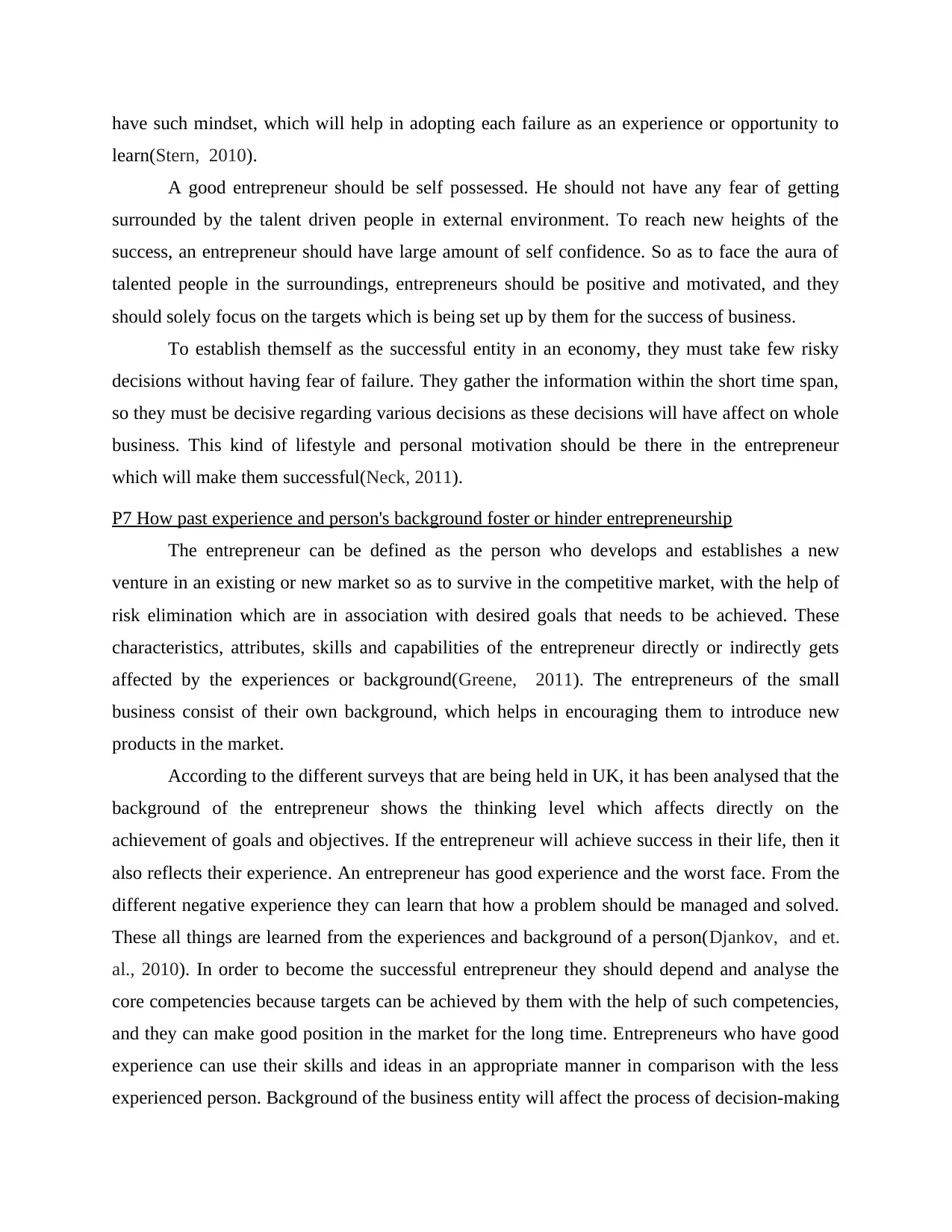
have such mindset, which will help in adopting each failure as an experience or opportunity to
learn(Stern, 2010).
A good entrepreneur should be self possessed. He should not have any fear of getting
surrounded by the talent driven people in external environment. To reach new heights of the
success, an entrepreneur should have large amount of self confidence. So as to face the aura of
talented people in the surroundings, entrepreneurs should be positive and motivated, and they
should solely focus on the targets which is being set up by them for the success of business.
To establish themself as the successful entity in an economy, they must take few risky
decisions without having fear of failure. They gather the information within the short time span,
so they must be decisive regarding various decisions as these decisions will have affect on whole
business. This kind of lifestyle and personal motivation should be there in the entrepreneur
which will make them successful(Neck, 2011).
P7 How past experience and person's background foster or hinder entrepreneurship
The entrepreneur can be defined as the person who develops and establishes a new
venture in an existing or new market so as to survive in the competitive market, with the help of
risk elimination which are in association with desired goals that needs to be achieved. These
characteristics, attributes, skills and capabilities of the entrepreneur directly or indirectly gets
affected by the experiences or background(Greene, 2011). The entrepreneurs of the small
business consist of their own background, which helps in encouraging them to introduce new
products in the market.
According to the different surveys that are being held in UK, it has been analysed that the
background of the entrepreneur shows the thinking level which affects directly on the
achievement of goals and objectives. If the entrepreneur will achieve success in their life, then it
also reflects their experience. An entrepreneur has good experience and the worst face. From the
different negative experience they can learn that how a problem should be managed and solved.
These all things are learned from the experiences and background of a person(Djankov, and et.
al., 2010). In order to become the successful entrepreneur they should depend and analyse the
core competencies because targets can be achieved by them with the help of such competencies,
and they can make good position in the market for the long time. Entrepreneurs who have good
experience can use their skills and ideas in an appropriate manner in comparison with the less
experienced person. Background of the business entity will affect the process of decision-making
learn(Stern, 2010).
A good entrepreneur should be self possessed. He should not have any fear of getting
surrounded by the talent driven people in external environment. To reach new heights of the
success, an entrepreneur should have large amount of self confidence. So as to face the aura of
talented people in the surroundings, entrepreneurs should be positive and motivated, and they
should solely focus on the targets which is being set up by them for the success of business.
To establish themself as the successful entity in an economy, they must take few risky
decisions without having fear of failure. They gather the information within the short time span,
so they must be decisive regarding various decisions as these decisions will have affect on whole
business. This kind of lifestyle and personal motivation should be there in the entrepreneur
which will make them successful(Neck, 2011).
P7 How past experience and person's background foster or hinder entrepreneurship
The entrepreneur can be defined as the person who develops and establishes a new
venture in an existing or new market so as to survive in the competitive market, with the help of
risk elimination which are in association with desired goals that needs to be achieved. These
characteristics, attributes, skills and capabilities of the entrepreneur directly or indirectly gets
affected by the experiences or background(Greene, 2011). The entrepreneurs of the small
business consist of their own background, which helps in encouraging them to introduce new
products in the market.
According to the different surveys that are being held in UK, it has been analysed that the
background of the entrepreneur shows the thinking level which affects directly on the
achievement of goals and objectives. If the entrepreneur will achieve success in their life, then it
also reflects their experience. An entrepreneur has good experience and the worst face. From the
different negative experience they can learn that how a problem should be managed and solved.
These all things are learned from the experiences and background of a person(Djankov, and et.
al., 2010). In order to become the successful entrepreneur they should depend and analyse the
core competencies because targets can be achieved by them with the help of such competencies,
and they can make good position in the market for the long time. Entrepreneurs who have good
experience can use their skills and ideas in an appropriate manner in comparison with the less
experienced person. Background of the business entity will affect the process of decision-making
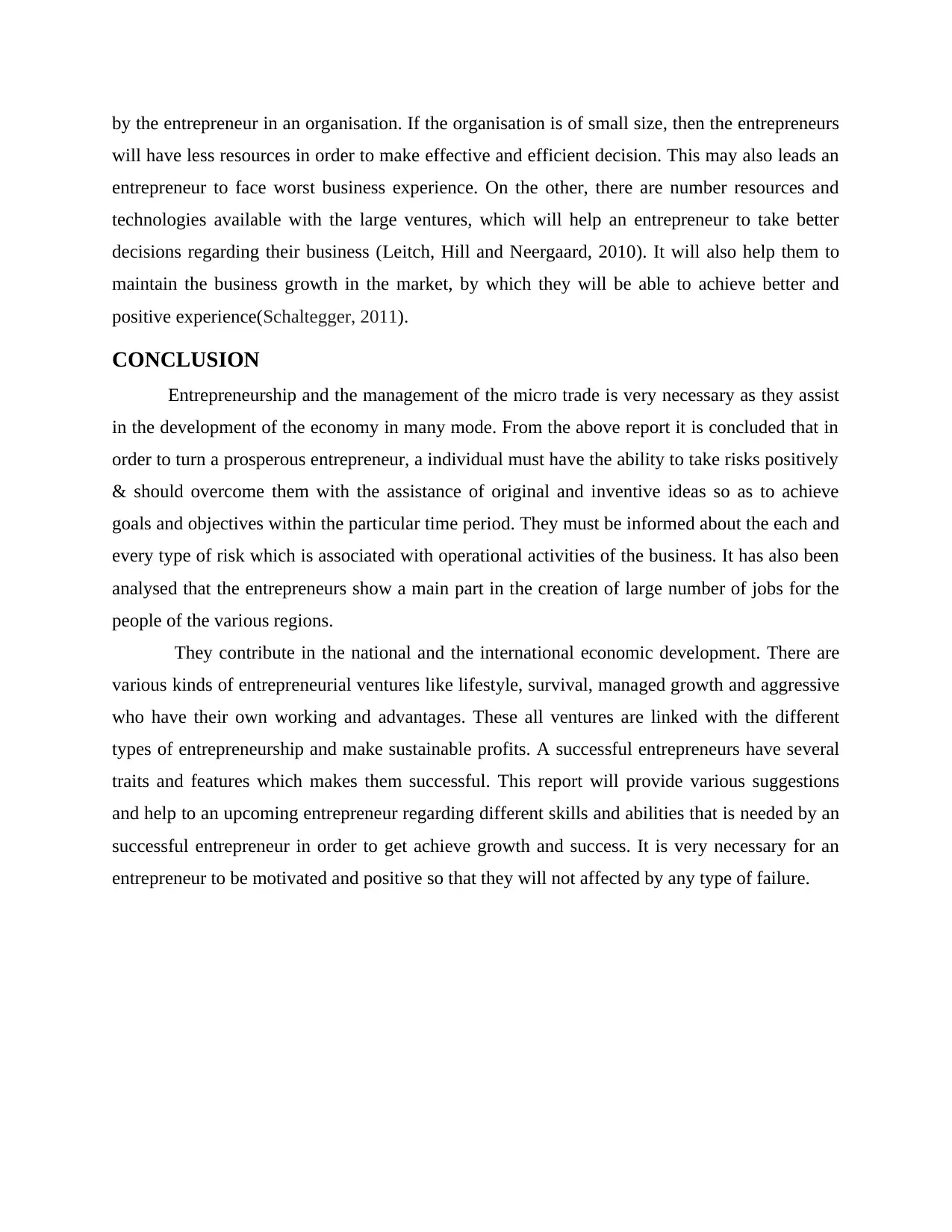
by the entrepreneur in an organisation. If the organisation is of small size, then the entrepreneurs
will have less resources in order to make effective and efficient decision. This may also leads an
entrepreneur to face worst business experience. On the other, there are number resources and
technologies available with the large ventures, which will help an entrepreneur to take better
decisions regarding their business (Leitch, Hill and Neergaard, 2010). It will also help them to
maintain the business growth in the market, by which they will be able to achieve better and
positive experience(Schaltegger, 2011).
CONCLUSION
Entrepreneurship and the management of the micro trade is very necessary as they assist
in the development of the economy in many mode. From the above report it is concluded that in
order to turn a prosperous entrepreneur, a individual must have the ability to take risks positively
& should overcome them with the assistance of original and inventive ideas so as to achieve
goals and objectives within the particular time period. They must be informed about the each and
every type of risk which is associated with operational activities of the business. It has also been
analysed that the entrepreneurs show a main part in the creation of large number of jobs for the
people of the various regions.
They contribute in the national and the international economic development. There are
various kinds of entrepreneurial ventures like lifestyle, survival, managed growth and aggressive
who have their own working and advantages. These all ventures are linked with the different
types of entrepreneurship and make sustainable profits. A successful entrepreneurs have several
traits and features which makes them successful. This report will provide various suggestions
and help to an upcoming entrepreneur regarding different skills and abilities that is needed by an
successful entrepreneur in order to get achieve growth and success. It is very necessary for an
entrepreneur to be motivated and positive so that they will not affected by any type of failure.
will have less resources in order to make effective and efficient decision. This may also leads an
entrepreneur to face worst business experience. On the other, there are number resources and
technologies available with the large ventures, which will help an entrepreneur to take better
decisions regarding their business (Leitch, Hill and Neergaard, 2010). It will also help them to
maintain the business growth in the market, by which they will be able to achieve better and
positive experience(Schaltegger, 2011).
CONCLUSION
Entrepreneurship and the management of the micro trade is very necessary as they assist
in the development of the economy in many mode. From the above report it is concluded that in
order to turn a prosperous entrepreneur, a individual must have the ability to take risks positively
& should overcome them with the assistance of original and inventive ideas so as to achieve
goals and objectives within the particular time period. They must be informed about the each and
every type of risk which is associated with operational activities of the business. It has also been
analysed that the entrepreneurs show a main part in the creation of large number of jobs for the
people of the various regions.
They contribute in the national and the international economic development. There are
various kinds of entrepreneurial ventures like lifestyle, survival, managed growth and aggressive
who have their own working and advantages. These all ventures are linked with the different
types of entrepreneurship and make sustainable profits. A successful entrepreneurs have several
traits and features which makes them successful. This report will provide various suggestions
and help to an upcoming entrepreneur regarding different skills and abilities that is needed by an
successful entrepreneur in order to get achieve growth and success. It is very necessary for an
entrepreneur to be motivated and positive so that they will not affected by any type of failure.
Paraphrase This Document
Need a fresh take? Get an instant paraphrase of this document with our AI Paraphraser
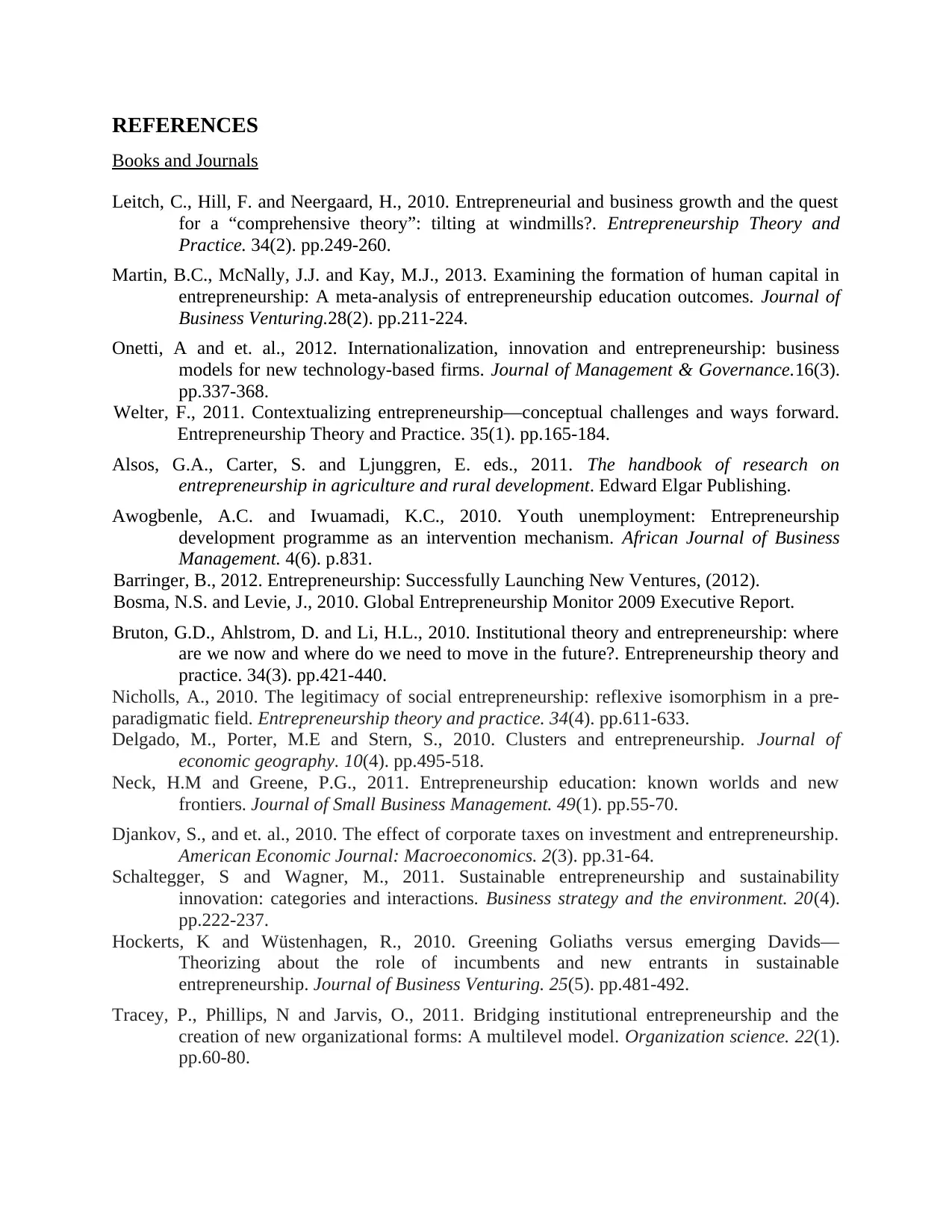
REFERENCES
Books and Journals
Leitch, C., Hill, F. and Neergaard, H., 2010. Entrepreneurial and business growth and the quest
for a “comprehensive theory”: tilting at windmills?. Entrepreneurship Theory and
Practice. 34(2). pp.249-260.
Martin, B.C., McNally, J.J. and Kay, M.J., 2013. Examining the formation of human capital in
entrepreneurship: A meta-analysis of entrepreneurship education outcomes. Journal of
Business Venturing.28(2). pp.211-224.
Onetti, A and et. al., 2012. Internationalization, innovation and entrepreneurship: business
models for new technology-based firms. Journal of Management & Governance.16(3).
pp.337-368.
Welter, F., 2011. Contextualizing entrepreneurship—conceptual challenges and ways forward.
Entrepreneurship Theory and Practice. 35(1). pp.165-184.
Alsos, G.A., Carter, S. and Ljunggren, E. eds., 2011. The handbook of research on
entrepreneurship in agriculture and rural development. Edward Elgar Publishing.
Awogbenle, A.C. and Iwuamadi, K.C., 2010. Youth unemployment: Entrepreneurship
development programme as an intervention mechanism. African Journal of Business
Management. 4(6). p.831.
Barringer, B., 2012. Entrepreneurship: Successfully Launching New Ventures, (2012).
Bosma, N.S. and Levie, J., 2010. Global Entrepreneurship Monitor 2009 Executive Report.
Bruton, G.D., Ahlstrom, D. and Li, H.L., 2010. Institutional theory and entrepreneurship: where
are we now and where do we need to move in the future?. Entrepreneurship theory and
practice. 34(3). pp.421-440.
Nicholls, A., 2010. The legitimacy of social entrepreneurship: reflexive isomorphism in a pre‐
paradigmatic field. Entrepreneurship theory and practice. 34(4). pp.611-633.
Delgado, M., Porter, M.E and Stern, S., 2010. Clusters and entrepreneurship. Journal of
economic geography. 10(4). pp.495-518.
Neck, H.M and Greene, P.G., 2011. Entrepreneurship education: known worlds and new
frontiers. Journal of Small Business Management. 49(1). pp.55-70.
Djankov, S., and et. al., 2010. The effect of corporate taxes on investment and entrepreneurship.
American Economic Journal: Macroeconomics. 2(3). pp.31-64.
Schaltegger, S and Wagner, M., 2011. Sustainable entrepreneurship and sustainability
innovation: categories and interactions. Business strategy and the environment. 20(4).
pp.222-237.
Hockerts, K and Wüstenhagen, R., 2010. Greening Goliaths versus emerging Davids—
Theorizing about the role of incumbents and new entrants in sustainable
entrepreneurship. Journal of Business Venturing. 25(5). pp.481-492.
Tracey, P., Phillips, N and Jarvis, O., 2011. Bridging institutional entrepreneurship and the
creation of new organizational forms: A multilevel model. Organization science. 22(1).
pp.60-80.
Books and Journals
Leitch, C., Hill, F. and Neergaard, H., 2010. Entrepreneurial and business growth and the quest
for a “comprehensive theory”: tilting at windmills?. Entrepreneurship Theory and
Practice. 34(2). pp.249-260.
Martin, B.C., McNally, J.J. and Kay, M.J., 2013. Examining the formation of human capital in
entrepreneurship: A meta-analysis of entrepreneurship education outcomes. Journal of
Business Venturing.28(2). pp.211-224.
Onetti, A and et. al., 2012. Internationalization, innovation and entrepreneurship: business
models for new technology-based firms. Journal of Management & Governance.16(3).
pp.337-368.
Welter, F., 2011. Contextualizing entrepreneurship—conceptual challenges and ways forward.
Entrepreneurship Theory and Practice. 35(1). pp.165-184.
Alsos, G.A., Carter, S. and Ljunggren, E. eds., 2011. The handbook of research on
entrepreneurship in agriculture and rural development. Edward Elgar Publishing.
Awogbenle, A.C. and Iwuamadi, K.C., 2010. Youth unemployment: Entrepreneurship
development programme as an intervention mechanism. African Journal of Business
Management. 4(6). p.831.
Barringer, B., 2012. Entrepreneurship: Successfully Launching New Ventures, (2012).
Bosma, N.S. and Levie, J., 2010. Global Entrepreneurship Monitor 2009 Executive Report.
Bruton, G.D., Ahlstrom, D. and Li, H.L., 2010. Institutional theory and entrepreneurship: where
are we now and where do we need to move in the future?. Entrepreneurship theory and
practice. 34(3). pp.421-440.
Nicholls, A., 2010. The legitimacy of social entrepreneurship: reflexive isomorphism in a pre‐
paradigmatic field. Entrepreneurship theory and practice. 34(4). pp.611-633.
Delgado, M., Porter, M.E and Stern, S., 2010. Clusters and entrepreneurship. Journal of
economic geography. 10(4). pp.495-518.
Neck, H.M and Greene, P.G., 2011. Entrepreneurship education: known worlds and new
frontiers. Journal of Small Business Management. 49(1). pp.55-70.
Djankov, S., and et. al., 2010. The effect of corporate taxes on investment and entrepreneurship.
American Economic Journal: Macroeconomics. 2(3). pp.31-64.
Schaltegger, S and Wagner, M., 2011. Sustainable entrepreneurship and sustainability
innovation: categories and interactions. Business strategy and the environment. 20(4).
pp.222-237.
Hockerts, K and Wüstenhagen, R., 2010. Greening Goliaths versus emerging Davids—
Theorizing about the role of incumbents and new entrants in sustainable
entrepreneurship. Journal of Business Venturing. 25(5). pp.481-492.
Tracey, P., Phillips, N and Jarvis, O., 2011. Bridging institutional entrepreneurship and the
creation of new organizational forms: A multilevel model. Organization science. 22(1).
pp.60-80.
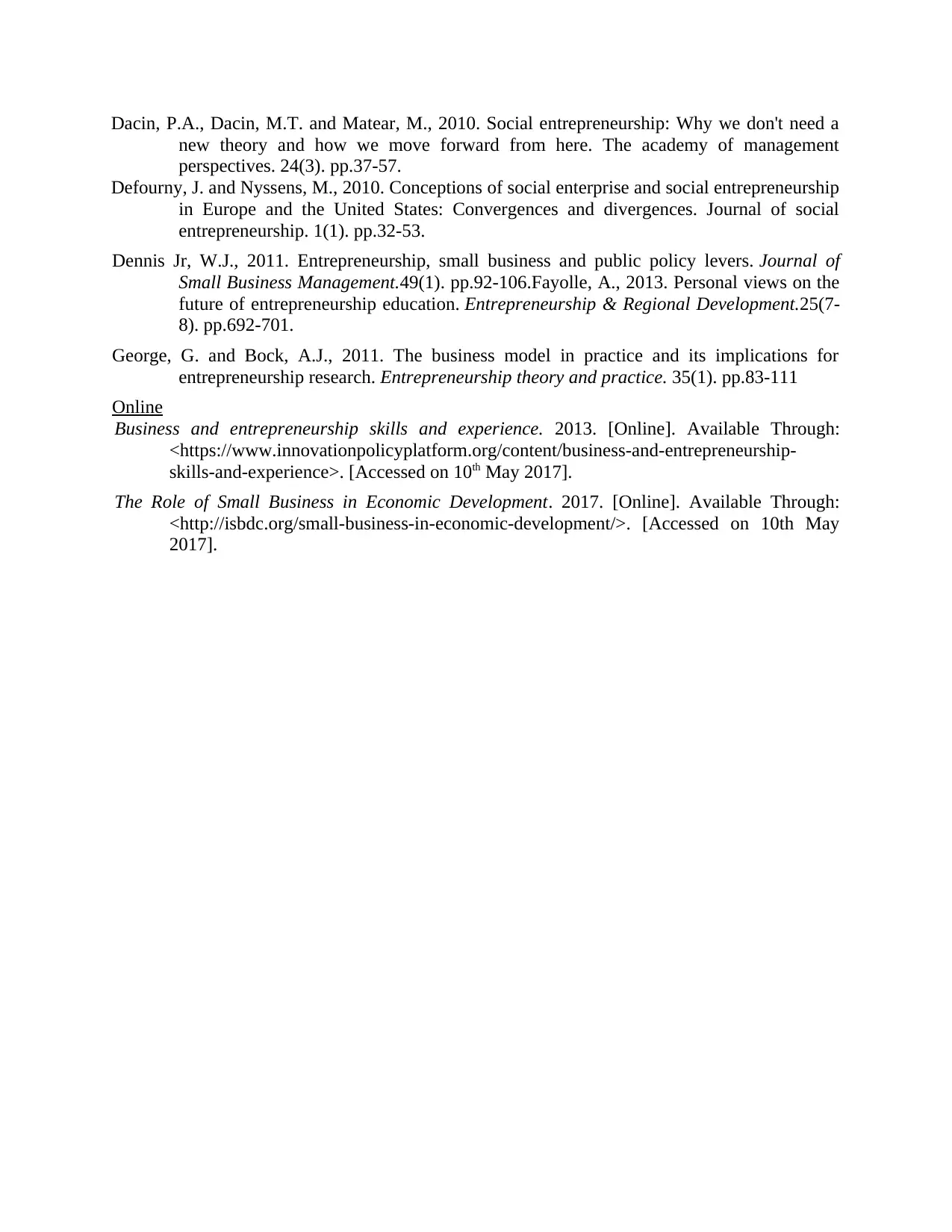
Dacin, P.A., Dacin, M.T. and Matear, M., 2010. Social entrepreneurship: Why we don't need a
new theory and how we move forward from here. The academy of management
perspectives. 24(3). pp.37-57.
Defourny, J. and Nyssens, M., 2010. Conceptions of social enterprise and social entrepreneurship
in Europe and the United States: Convergences and divergences. Journal of social
entrepreneurship. 1(1). pp.32-53.
Dennis Jr, W.J., 2011. Entrepreneurship, small business and public policy levers. Journal of
Small Business Management.49(1). pp.92-106.Fayolle, A., 2013. Personal views on the
future of entrepreneurship education. Entrepreneurship & Regional Development.25(7-
8). pp.692-701.
George, G. and Bock, A.J., 2011. The business model in practice and its implications for
entrepreneurship research. Entrepreneurship theory and practice. 35(1). pp.83-111
Online
Business and entrepreneurship skills and experience. 2013. [Online]. Available Through:
<https://www.innovationpolicyplatform.org/content/business-and-entrepreneurship-
skills-and-experience>. [Accessed on 10th May 2017].
The Role of Small Business in Economic Development. 2017. [Online]. Available Through:
<http://isbdc.org/small-business-in-economic-development/>. [Accessed on 10th May
2017].
new theory and how we move forward from here. The academy of management
perspectives. 24(3). pp.37-57.
Defourny, J. and Nyssens, M., 2010. Conceptions of social enterprise and social entrepreneurship
in Europe and the United States: Convergences and divergences. Journal of social
entrepreneurship. 1(1). pp.32-53.
Dennis Jr, W.J., 2011. Entrepreneurship, small business and public policy levers. Journal of
Small Business Management.49(1). pp.92-106.Fayolle, A., 2013. Personal views on the
future of entrepreneurship education. Entrepreneurship & Regional Development.25(7-
8). pp.692-701.
George, G. and Bock, A.J., 2011. The business model in practice and its implications for
entrepreneurship research. Entrepreneurship theory and practice. 35(1). pp.83-111
Online
Business and entrepreneurship skills and experience. 2013. [Online]. Available Through:
<https://www.innovationpolicyplatform.org/content/business-and-entrepreneurship-
skills-and-experience>. [Accessed on 10th May 2017].
The Role of Small Business in Economic Development. 2017. [Online]. Available Through:
<http://isbdc.org/small-business-in-economic-development/>. [Accessed on 10th May
2017].
1 out of 15
Related Documents
Your All-in-One AI-Powered Toolkit for Academic Success.
+13062052269
info@desklib.com
Available 24*7 on WhatsApp / Email
![[object Object]](/_next/static/media/star-bottom.7253800d.svg)
Unlock your academic potential
© 2024 | Zucol Services PVT LTD | All rights reserved.





